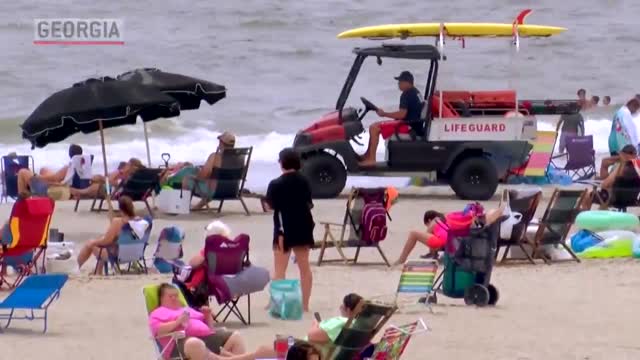Health Officials Warn Weekend Revelers Of 'Tragic Impact'
Health Officials Warn Weekend Revelers Of 'Tragic Impact' Missouri's health director issued a dire warning after photos and video showed Memorial Day weekend revelers partying close together: The coronavirus is still here, and the spreading of illnesses could have "long-lasting and tragic" results.Tuesday, May 26th 2020, 8:23 am
Missouri's health director issued a dire warning after photos and video showed Memorial Day weekend revelers partying close together: The coronavirus is still here, and the spreading of illnesses could have "long-lasting and tragic" results.
One video on social media showed a crammed pool at Lake of the Ozarks, with people lounging and playing close together, without masks.
Scott Pasmore, an anchor at CBS Arizona affiliate KTVK-TV, captioned the video, "No covid concerns at the lake of the ozarks."
The lake draws people not only from as far away as Arkansas and Iowa. It's an especially popular spot for travelers from St. Louis city and county, which combined account for more than half of Missouri's 12,167 confirmed cases of COVID-19, the illness caused by the virus, and more than two-thirds of the state's 685 deaths.
The St. Louis County Public Health Department urged anyone who did not socially distance at the lake to self-quarantine. "Any person who has travelled and engaged in this behavior should self-quarantine for 14 days or until they receive a negative test result for COVID-19," the travel advisory said.
Bars, restaurants and hotels at Lake of the Ozarks also had big crowds, and they weren't alone. In Hannibal, Mark Twain's hometown and a popular regional tourist attraction, people could be seen sitting shoulder-to-shoulder inside and out at downtown bars and restaurants over the weekend.
Republican Gov. Mike Parson allowed Missouri businesses and attractions to reopen May 4, but the state order requires 6-foot social distancing through at least the end of May. The order leaves it up to local and state health officials to enforce social distancing.
The sheriff of Camden County, the area of the lake that attracts the most visitors, said in a statement that there is no crime related to social distancing "and therefore the sheriff's office has no authority to enforce actions in that regard."
"We expect residents and visitors alike to exhibit personal responsibility when at the lake," Sheriff Tony Helms said. "We also respect the right of citizens to move freely around the lake and take responsibility to protect themselves from any expected dangers related to COVID-19."
But the images clearly caught the eye of other public officials.
"This Memorial Day, we caution that COVID-19 is still here, and social distancing needs to continue to prevent further spread of infections," Missouri Department of Health and Senior Services Director Randall Williams said in a statement.
Video from the Lake of the Ozarks typically showed younger people. Williams said close contact, even in the outdoors, can lead to more infections, even among the young and healthy who may not experience symptoms.
"When they then carry the virus and transmit it to a more vulnerable person, this is when we tend to see the long-lasting and tragic impact of these decisions that are being made," Williams said.
The video from the Lake of the Ozarks prompted a stern warning from St. Louis County.
"This reckless behavior endangers countless people and risks setting us back substantially from the progress we have made in slowing the spread of COVID-19," Dr. Sam Page, the county executive, said in a statement.
St. Louis Mayor Lyda Krewson, in a statement, called it "irresponsible and dangerous" to engage in such high-risk behavior.
"Now, these folks will be coming home to St. Louis and counties all over Missouri and the Midwest, raising concerns about the potential of more positive cases, hospitalizations, and tragically, deaths," Krewson said in a statement. "It's just deeply disturbing."
St. Louis Health Department spokesman Harold Bailey said officials are "greatly concerned" that city residents will return from large gatherings and bring the virus back with them.
"That could negate, or even set back the mitigation efforts we have accomplished up to this point in the pandemic," Bailey said in an email.
First published on May 26, 2020 / 6:28 AM
© 2020 CBS Interactive Inc. All Rights Reserved. This material may not be published, broadcast, rewritten, or redistributed. The Associated Press contributed to this report.
More Like This
May 26th, 2020
March 8th, 2022
January 21st, 2022
January 13th, 2022
Top Headlines
April 8th, 2025
April 8th, 2025
April 8th, 2025










